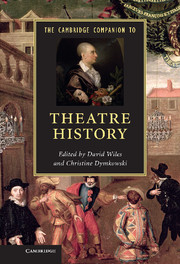10 - Reflections on a global theatre history
from Part III - Where?
Published online by Cambridge University Press: 05 February 2013
Summary
When theatre history was established as a field of study in the late nineteenth century, its focus, like that of political or social history, was upon the changes and developments in the object of study over time. A spatial understanding of this art was recognised as crucial by theatre historians from the beginning. Indeed one might argue that the essential feature that distinguished theatre history from the field of literary history out of which it generally developed was an interest in theatre as a spatial rather than as a textual phenomenon. Soon, however, this spatial interest expanded from a specific interest in the dynamics of the enacted literary text to a concern with theatre as a cultural event, embedded within a particular cultural space. The overall organisation of theatre history, from its creation as a discipline, has been geographical in nature, primarily concerned with tracing the development of theatre within a small and highly select number of modern, almost entirely Western European nation-states.
When Max Herrmann in Germany and scholars with similar concerns began developing the historical analysis of theatre, the European nation-state was the major form of socio/cultural organisation with which they were familiar, dominant in Europe and widely and usually arbitrarily imposed throughout the rest of the globe by the European colonial powers. The major divisions within theatre history were the boundaries of these states. For most of its first century of development theatre history was not only essentially organised by nation-states but was extremely selective in its choice of which such states were considered worthy of study. Very soon an almost invariable and highly restricted narrative of so-called world theatre was developed, which may still be found in the majority of textbooks on this field of study. According to this narrative, after the obligatory introductory chapters on ritual drama in ancient Egypt and the theatres of classical Greece and Rome (in fact treated as modern unified nation-states – who noted where in the world Hellenistic theatres were actually located or observed that such ‘Roman’ church fathers as Augustine and Tertullian actually came from North Africa?), standard theatre went on to cover an only vaguely geographically designated ‘middle ages’ (in fact in its details largely English), and then settled more comfortably into individual narratives of the theatres within modern national boundaries, headed by England, France, Italy, Germany, Spain and the United States.
- Type
- Chapter
- Information
- The Cambridge Companion to Theatre History , pp. 149 - 162Publisher: Cambridge University PressPrint publication year: 2012
References
- 4
- Cited by

